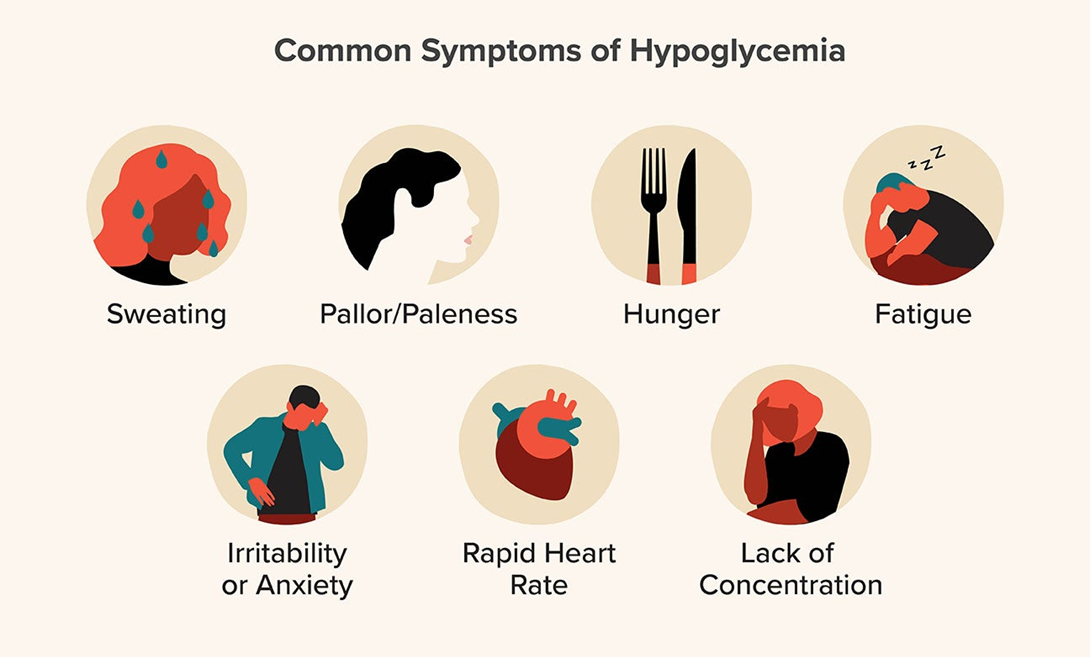A nurse should expect which of the following conditions in a client who has hypoglycemia?
Oliguria.
Diplopia.
Hypoglycemia.
Dizziness.
The Correct Answer is D
Choice A reason: Oliguria is not a condition that a nurse should expect in a client who has hypoglycemia. Oliguria is a reduced urine output, typically defined as less than 0.5 ml/kg/hour in an adult³. Oliguria can be a sign of dehydration, kidney failure, or urinary obstruction, but it is not related to low blood sugar levels.
Choice B reason: Diplopia is not a condition that a nurse should expect in a client who has hypoglycemia. Diplopia is a double vision, or seeing two images of a single object. Diplopia can be caused by various eye problems, such as strabismus, cataracts, or nerve damage, but it is not a common symptom of low blood sugar levels.
Choice C reason: Hypoglycemia is not a condition that a nurse should expect in a client who has hypoglycemia. Hypoglycemia is the condition itself, not a symptom. Hypoglycemia is a low blood sugar level, usually below 70 mg/dl. Hypoglycemia can result from taking too much insulin or other diabetes medications, skipping or delaying meals, exercising more than usual, or drinking alcohol.
Choice D reason: Dizziness is a condition that a nurse should expect in a client who has hypoglycemia. Dizziness is a feeling of lightheadedness, faintness, or unsteadiness. Dizziness can occur when the brain does not receive enough glucose, which is its main energy source. Dizziness can also be accompanied by other symptoms of hypoglycemia, such as confusion, hunger, sweating, shakiness, or weakness.

Nursing Test Bank
Naxlex Comprehensive Predictor Exams
Related Questions
Correct Answer is D
Explanation
Choice A reason: A child who has a BMI of 18 is not the highest priority, as it is within the normal range for children. BMI, or body mass index, is a measure of weight relative to height. A BMI of 18 is considered healthy for children aged 2 to 20 years, according to the Centers for Disease Control and Prevention (CDC). The nurse should monitor the child's growth and development and provide nutrition education as needed.
Choice B reason: An adolescent who has scoliosis is not the highest priority, as it is a common and usually mild condition. Scoliosis is a sideways curvature of the spine that affects about 3% of adolescents. Most cases of scoliosis are mild and do not require treatment, although some may need braces or surgery. The nurse should refer the adolescent to a specialist for further evaluation and management.
Choice C reason: An adolescent who has psoriasis is not the highest priority, as it is a chronic and non-contagious condition. Psoriasis is a skin disorder that causes red, scaly patches on the skin that may itch or burn. Psoriasis is not curable, but it can be controlled with medications, creams, or light therapy. The nurse should provide education and support to the adolescent and encourage them to seek medical care as needed.
Choice D reason: A child who has nits is the highest priority, as it indicates a parasitic infestation that can spread to others. Nits are the eggs of head lice, which are tiny insects that live on the scalp and feed on blood. Head lice can cause itching, irritation, and infection of the scalp. The nurse should isolate the child and notify the parents and the school staff. The nurse should also provide instructions on how to treat the infestation and prevent reinfestation.

Correct Answer is B
Explanation
Choice A reason: A fee-for-service health care insurance program is not a payment structure of a health maintenance organization. In a fee-for-service program, the client pays a premium to the insurer, and the insurer pays the provider for each service rendered, regardless of the outcome or quality of care.
Choice B reason: A fixed sum payment for the client on a monthly or yearly basis is a payment structure of a health maintenance organization. In this structure, the provider receives a set amount of money per client per period of time, regardless of the number or type of services provided. This encourages the provider to deliver preventive and primary care, and to avoid unnecessary or costly procedures.
Choice C reason: A percentage of the total costs for each service rendered by the provider is not a payment structure of a health maintenance organization. This is a type of cost-sharing arrangement, where the client pays a portion of the expenses and the insurer pays the rest. This may result in higher out-of-pocket costs for the client and higher utilization of services by the provider.
Choice D reason: A predetermined percentage of the cost of services is not a payment structure of a health maintenance organization. This is a type of discounted fee-for-service arrangement, where the provider agrees to accept a lower fee than the usual charge for each service. This may reduce the costs for the insurer, but not necessarily for the client or the provider.
Whether you are a student looking to ace your exams or a practicing nurse seeking to enhance your expertise , our nursing education contents will empower you with the confidence and competence to make a difference in the lives of patients and become a respected leader in the healthcare field.
Visit Naxlex, invest in your future and unlock endless possibilities with our unparalleled nursing education contents today
Report Wrong Answer on the Current Question
Do you disagree with the answer? If yes, what is your expected answer? Explain.
Kindly be descriptive with the issue you are facing.
